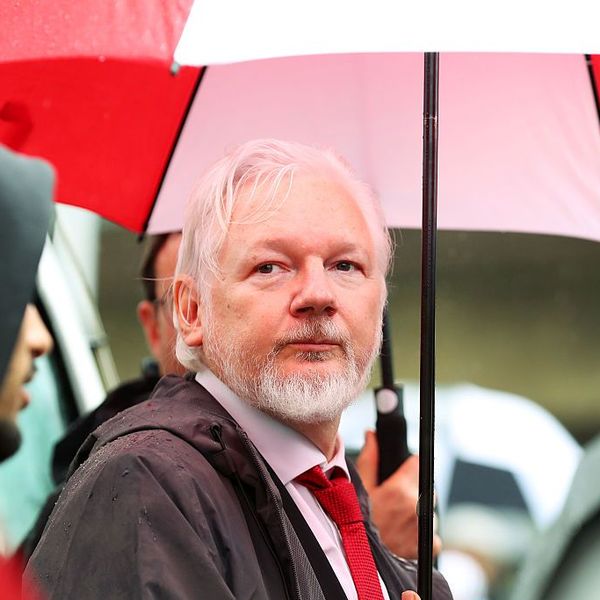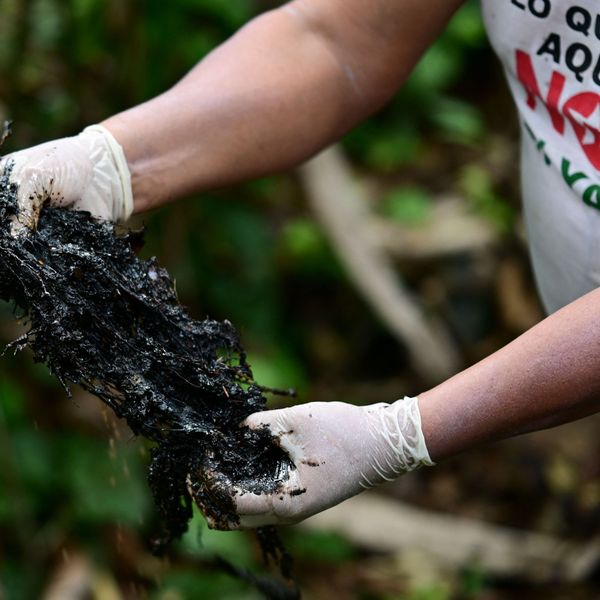Ecuador Accuses UK of Defying Laws of Political Aslyum in Assange Case
Foreign Minister says it is 'not acceptable' for UK to blame Ecuador over WikiLeaks founder's deadlocked legal case
Ecuador on Monday responded to the UK government over its statements on the languishing legal case of WikiLeaks founder Julian Assange, who has been living in asylum at the Ecuadorian embassy in London for more than three years.
Last week, the UK's Foreign Office lodged a formal protest against Ecuador for blocking Assange's case from moving forward, claiming that giving him asylum prevents Britain from extraditing Assange to Sweden, where he is wanted for questioning over sexual assault allegations. The Foreign Office called his extradition a legal obligation.
Ecuador's acting Foreign Minister, Xavier Lasso, rejected those claims. "It is not acceptable to try to place the responsibility for the lack of progress in this area over the last five years on Ecuador," he said Monday. "The republic of Ecuador will not take lessons from any foreign government, least of all those unaware of the institution of political asylum, its legitimacy, attached and enshrined in international law, and its humanitarian nature based on the sovereign equality of nations."
The British government had previously threatened to "violate the immunity of diplomatic premises" and has kept a police cordon outside the embassy around the clock at a sky-high cost to taxpayers, Lasso said. "The British government has the sole responsibility for such an invasive and unnecessary police deployment."
Three of the four investigations pending against Assange were dropped last week after the ability to bring charges expired. The WikiLeaks founder has repeatedly invited Swedish prosecutors to interview him at the embassy, but they have rejected those requests. Assange has said he fears that submission to Swedish authorities will lead to his extradition to the U.S. due to his work exposing classified Pentagon and State Department documents.
An Urgent Message From Our Co-Founder
Dear Common Dreams reader, The U.S. is on a fast track to authoritarianism like nothing I've ever seen. Meanwhile, corporate news outlets are utterly capitulating to Trump, twisting their coverage to avoid drawing his ire while lining up to stuff cash in his pockets. That's why I believe that Common Dreams is doing the best and most consequential reporting that we've ever done. Our small but mighty team is a progressive reporting powerhouse, covering the news every day that the corporate media never will. Our mission has always been simple: To inform. To inspire. And to ignite change for the common good. Now here's the key piece that I want all our readers to understand: None of this would be possible without your financial support. That's not just some fundraising cliche. It's the absolute and literal truth. We don't accept corporate advertising and never will. We don't have a paywall because we don't think people should be blocked from critical news based on their ability to pay. Everything we do is funded by the donations of readers like you. Will you donate now to help power the nonprofit, independent reporting of Common Dreams? Thank you for being a vital member of our community. Together, we can keep independent journalism alive when it’s needed most. - Craig Brown, Co-founder |
Ecuador on Monday responded to the UK government over its statements on the languishing legal case of WikiLeaks founder Julian Assange, who has been living in asylum at the Ecuadorian embassy in London for more than three years.
Last week, the UK's Foreign Office lodged a formal protest against Ecuador for blocking Assange's case from moving forward, claiming that giving him asylum prevents Britain from extraditing Assange to Sweden, where he is wanted for questioning over sexual assault allegations. The Foreign Office called his extradition a legal obligation.
Ecuador's acting Foreign Minister, Xavier Lasso, rejected those claims. "It is not acceptable to try to place the responsibility for the lack of progress in this area over the last five years on Ecuador," he said Monday. "The republic of Ecuador will not take lessons from any foreign government, least of all those unaware of the institution of political asylum, its legitimacy, attached and enshrined in international law, and its humanitarian nature based on the sovereign equality of nations."
The British government had previously threatened to "violate the immunity of diplomatic premises" and has kept a police cordon outside the embassy around the clock at a sky-high cost to taxpayers, Lasso said. "The British government has the sole responsibility for such an invasive and unnecessary police deployment."
Three of the four investigations pending against Assange were dropped last week after the ability to bring charges expired. The WikiLeaks founder has repeatedly invited Swedish prosecutors to interview him at the embassy, but they have rejected those requests. Assange has said he fears that submission to Swedish authorities will lead to his extradition to the U.S. due to his work exposing classified Pentagon and State Department documents.
Ecuador on Monday responded to the UK government over its statements on the languishing legal case of WikiLeaks founder Julian Assange, who has been living in asylum at the Ecuadorian embassy in London for more than three years.
Last week, the UK's Foreign Office lodged a formal protest against Ecuador for blocking Assange's case from moving forward, claiming that giving him asylum prevents Britain from extraditing Assange to Sweden, where he is wanted for questioning over sexual assault allegations. The Foreign Office called his extradition a legal obligation.
Ecuador's acting Foreign Minister, Xavier Lasso, rejected those claims. "It is not acceptable to try to place the responsibility for the lack of progress in this area over the last five years on Ecuador," he said Monday. "The republic of Ecuador will not take lessons from any foreign government, least of all those unaware of the institution of political asylum, its legitimacy, attached and enshrined in international law, and its humanitarian nature based on the sovereign equality of nations."
The British government had previously threatened to "violate the immunity of diplomatic premises" and has kept a police cordon outside the embassy around the clock at a sky-high cost to taxpayers, Lasso said. "The British government has the sole responsibility for such an invasive and unnecessary police deployment."
Three of the four investigations pending against Assange were dropped last week after the ability to bring charges expired. The WikiLeaks founder has repeatedly invited Swedish prosecutors to interview him at the embassy, but they have rejected those requests. Assange has said he fears that submission to Swedish authorities will lead to his extradition to the U.S. due to his work exposing classified Pentagon and State Department documents.

